CPHI Barcelona Sustainability Partner Interview – Olon pushes for progress

Olon, the leading CDMO and API supplier has partnered with CPHI Barcelona to support sustainability initiatives, to be highlighted at the CPHI Worldwide event in Barcelona in October 2023.
In this interview Sabrina Spina, Head of Global Communication from Olon, discusses the importance of sustainability to Olon, the wider pharmaceutical industry, and the ways in which they are encouraging growth and progress in this area.
Sabrina Spina leads the communication function at Olon Group, with a focus on company’s sustainability leadership. Sabrina promotes the group's image on a global level, associating its values and strategic assets, managing corporate reputation in the countries where the company operates. Under her leadership, Olon has significantly reinforced the communication of its commitment as innovative and sustainable player in pharma space.
Could you please outline Olon’s commitments and targets for sustainability?
Along the path we have firmly set out on, 2022 was marked by great strides toward environmental sustainability and energy transition, significant investment in systems that harness alternative energy sources, and social and economic involvement and support for the communities in which we operate. We reasserted our commitment to creating an increasingly sustainable and certified supply and production chain by transferring our values and standards to our global suppliers, and we continued our efforts to develop innovative production processes with an ever-decreasing environmental impact through research and development projects. Finally, we must mention the essential support of our people, the people who are part of our organization and are our real driving force. Inclusion, diversity, development, and safety are the themes we focused on and engaged in across the board, by integrating our strategy and operational decisions. We have achieved important results in cutting electricity and water consumption: our aim is to reduce electricity and water use and carbon dioxide emissions by 60% between 2015 and 2025.
We employ second-generation processes and green chemistry, while researching various sustainable technologies to reduce energy consumption and waste production whilst ensuring the maximum safety of our products. All these numerous efforts and initiatives resulted in progress and successes around sustainability.
Olon promotes the importance of a circular economy, could you please explain why this is so important and what strategies you are using to achieve this?
An important part of Olon’s strategy towards environmental sustainability refers to circular economy. We strive every day to promote circular business models that combine a responsible use of natural resources and raw materials with a responsible waste management approach. Moreover, we promote and develop solutions aimed at recycling and reusing materials, energy and waste.
We make sure that all systems guarantee and provide for the safe handling, movement, storage, recycling, reuse, or management of waste and materials, and prevent and mitigate accidental spills and release of fuels, waste, chemicals, intermediates, products, and other hazardous materials into the environment.
Olon’s circular initiatives focus on increasing the manufacturing processes efficiency. In fact, the Company tries to optimise plant performances, to reduce the amount of energy, materials, and natural resources they need.
Throughout the years, Olon has also introduced technologies to increase the degree of production containment and to protect workers and the environment; we have equipped them with innovative technology for the valorisation of materials, such as the introduction of distillation columns for solvent recovery, which allowed to reduce the waste generated, reusing solvents that would otherwise be diverted to disposal. We are focusing on green chemistry projects for the replacement of chlorinated solvents and the reduction of critical substances that could be particularly toxic, especially on new manufacturing processes. Olon recovers and reuses solvents during the production cycle or sends them to external recovery sites.
What role does ethics play in making businesses more sustainable?
Our organisation recognises the utmost importance of ethical-social responsibility when conducting business and corporate activities and is committed to respecting the legitimate interests of all stakeholders and the communities where it operates. Therefore, Olon has adopted a Code of Ethics to constitute a guide in decision-making and action-taking that is consistent with the principles of responsibility, transparency, and long-term value creation, by contributing to sustainable development. Given the respect for laws and regulations in all countries where the company operates, management, employees and all organisations that work with Olon based on a contractual relationship, even on a temporary basis are required to sign the Code of Ethics, imprinting their behaviour on the principles and criteria set forth therein. Being compliant with the code is essential for the proper operation and reliability of the company’s fundamental elements for the success and current and future development of the business.
Olon’s Supplier Code of Conduct represents the foundation of the sustainable procurement program. This key document communicates organisation position on the performance standards suppliers are expected to work towards as a part of doing business with us. All new suppliers must sign the document and ensure the company’s same level of sustainability in terms of environmental protection, workers health and safety and production quality and safety. Moreover, since the supply chain is diversified, all the suppliers that provide critical materials and with whom the collaboration started before Olon established our Supplier Code of Conduct, sign the code retroactively.
In 2022, 100% of new suppliers signed the Code of Conduct and more than 78% of global purchases come from suppliers that have formally accepted and signed the Code of Conduct.
Olon are proactive in supporting the communities where their sites are based, how do you do this and why is it so central to Olon’s ethos?
Olon strongly believes in the importance of supporting the communities where its sites are based. The company takes care of the socio-economic development of the people living in the places where it operates, but it also engages in activities with all stakeholders, to develop ideas and innovations capable of improving the life conditions of local communities. This constant value creation process with Olon’s communities and stakeholders is an intangible asset both for the business and for those the company engages with.
Among the other projects, since 2019 we have been contributing to the distribution of hydroxyurea-based treatments in Ghana. In collaboration with Novartis, Olon participates in a public-private partnership involving the African state’s own government. This partnership is unique in its kind, since it is aimed at helping the local population suffering from sickle cell disease. Olon has covered the costs of more than 24,000 treatments on an annual basis.
How are you using technology and biotechnology to progress more sustainably?
We strive to continually drive innovation in advanced science, while creating long-term value for all stakeholders, through sustainable industrial and technological solutions.
Innovation is embedded in the company business model, enabling us to be more agile on sharpening the focus on core business and optimising the phases of research, while maintaining high standards of product quality and safety, ensuring their accessibility to a wide range of people and reducing environmental footprint.
Olon is working on edge-cutting R&D processes applied both to chemistry, in terms of flow chemistry, photochemistry, electrochemistry, and to biotechnologies. Investing in and developing technological advances allows the organisation to combine well-established practices with new ones, to guarantee efficient and successful manufacturing processes, at the same time ensuring safe, fast and cost-effective commercial processes.
Finally, partnerships with institutions and universities are essential drivers for innovation, since networking leads to sharing knowledge, strategies, and best practices that generate solutions to benefit everyone.
I’m proud to cite as just an example, the International Network of Biocatalysis we launched in 2022. It is an innovative scientific platform for the study and development of new industrial applications of biocatalysis, with the objective to launch large-scale biocatalysis as an industrial technology used within Olon production facilities in Italy and around the world. The research project will follow a virtuous model of collaboration between Olon Group, the HIMS-Biocat group led by Professor Francesco Mutti, who has pioneered ground-breaking research in enzyme engineering and the use of enzymes for performing novel, sustainable and “green” chemical reactions, and Biosphere, an Italian SME specialised in fermentation and industrial biotechnology.
Connect with Olon on LinkedIn, or for more information see their website.
Find out more about sustainability with Olon by contacting them ahead of CPHI Barcelona by clicking the button below!
Related News
-
News CPHI Pharma Awards 2023 – Supply Chain Excellence Winners: Catalent Case Management Services
After another year of impressive nominations for the CPHI Pharma Awards our winners were announced at CPHI Barcelona in October. In this series of interviews, we speak to the people and teams behind the award-winning projects, concepts, and technologie... -
News CPHI Pharma Awards 2023 – API Development and Innovation Winners: Snapdragon Chemistry, a Cambrex Company
After another year of impressive nominations for the CPHI Pharma Awards our winners were announced at CPHI Barcelona in October. In this series of interviews, we speak to the teams behind the award-winning projects, concepts, and technologies. -
News Navigating the Future: Challenges and Opportunities in Pharma Innovation and Investment – CPHI Barcelona 2023 Roundtable Report
In this comprehensive downloadable report, hear from a range of experts in finance and investment in the pharma industry on what investment trends will be shaping the future of the industry, in Catalonia, and the wider world. -
News CPHI Barcelona 2023: Partnering for Success – Managing Outsourcing Relationships to Optimise Manufacturing Operations
During CPHI Barcelona 2023, insightful content sessions offered attendees the chance to explore trending topics with expert speakers and panellists. Here, we summarise what the pharma industry and supply chain are talking about the most. -
News CPHI Podcast Series: The 2023 Retro – what have we learnt from the past year in pharma?
Welcome to the last episode of 2023! Digital Editor Lucy Chard is joined by her teammates in a special retrospective episode to close out the year. Guests Vivian Xie, Editor for CPHI Online and Tara Dougal, Content Director for Pharma, discuss their hi... -
News CPHI Pharma Awards 2023 – Accelerating Innovation Winners: React4Life
After another year of impressive nominations for the CPHI Pharma Awards our winners were announced at CPHI Barcelona in October. In this series of interviews, we speak to the teams behind the award-winning projects, concepts, and technologies. -
News CPHI Pharma Awards 2023 – Regulatory & Compliance Winners: Lambda Therapeutic Research Ltd.
After another year of impressive nominations for the CPHI Pharma Awards our winners were announced at CPHI Barcelona in October. In this series of interviews, we speak to the teams behind the award-winning projects, concepts, and technologies. -
News CPHI Barcelona 2023: Loading Potential – Artificial Intelligence for Pharma Manufacturing
During CPHI Barcelona 2023, insightful content sessions offered attendees the chance to explore trending topics with expert speakers and panellists. Here, we summarise what the pharma industry and supply chain are talking about the most.
Position your company at the heart of the global Pharma industry with a CPHI Online membership
-
Your products and solutions visible to thousands of visitors within the largest Pharma marketplace
-
Generate high-quality, engaged leads for your business, all year round
-
Promote your business as the industry’s thought-leader by hosting your reports, brochures and videos within your profile
-
Your company’s profile boosted at all participating CPHI events
-
An easy-to-use platform with a detailed dashboard showing your leads and performance

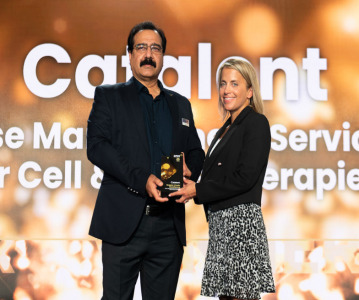
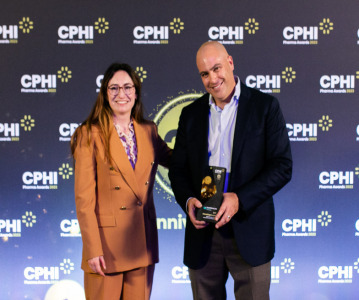
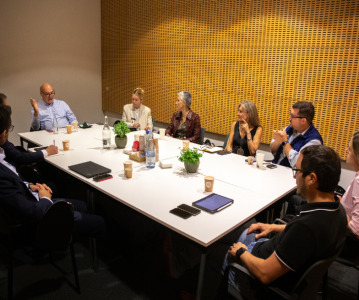

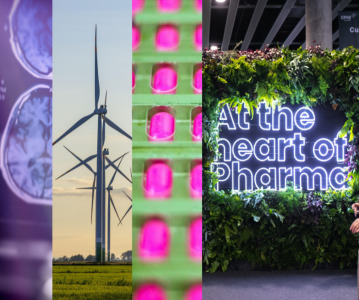
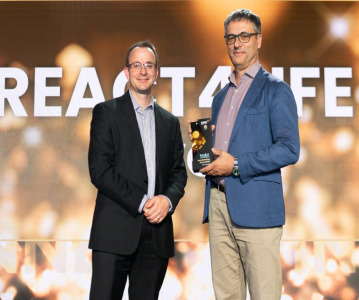

.png)